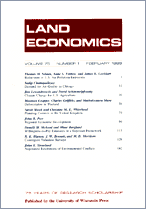An email from Chuhang Yin, a former student of mine:
I just read your newest blog post and I am fascinated by this topic. I found a recent [Quarterly Journal of Political Science] paper by Alexander Lee and Kenneth Schultz at Stanford titled “Comparing British and French Colonial Legacies: A Discontinuity Analysis of Cameroon” and think it might be relevant. Their focus is on public goods and individual wealth, but not on land productivity. The abstract is here:
“Colonial institutions are thought to be an important determinate of post-independence levels of political stability, economic growth, and public goods provision. In particular, many scholars have suggested that British institutional and cultural legacies are more conducive to growth than those of France or other colonizers. Systematic tests of this hypothesis are complicated by unobserved heterogeneity among nations due to variable pre- and post-colonial histories. We focus on the West African nation of Cameroon, which includes regions colonized by both Britain and France, and use the artificial former colonial boundary as a discontinuity within a national demographic survey. We show that rural areas on the British side of discontinuity have higher levels of household wealth and local public provision of piped water. Results for urban areas and centrally-provided public goods show no such effect, suggesting that post-independence policies also play a role in shaping outcomes.”
Specifically about results:
“Using data from the 2004 Demographic and Health Survey of Cameroon, we compare communities near the former colonial border using both a regression discontinuity research design and a comparison of neighboring villages that straddle the boundary. We show that rural households on the British side have higher levels of wealth and are more likely to have access to piped water, a locally provided public good. These results do not hold for urban areas or for centrally-provided public goods like roads and education, suggesting that the effect of colonial-era differences can be attenuated by post-colonial policies.”
I also found a paper published in 2000 in Comparative Politics titled “Institutions, Context, and Outcomes: Explaining French and British Rule in West Africa” which might also be useful:
“I seek to solve this puzzle by tracing the origin of class formation in Ivory Coast’s and Ghana’s rural areas. Specifically, French and British colonial institutions generated different property rights and landholding patterns, forming the basis for different patterns of class formation.”
On page 258 to 260 the author discusses the differences of British and French institutions.


